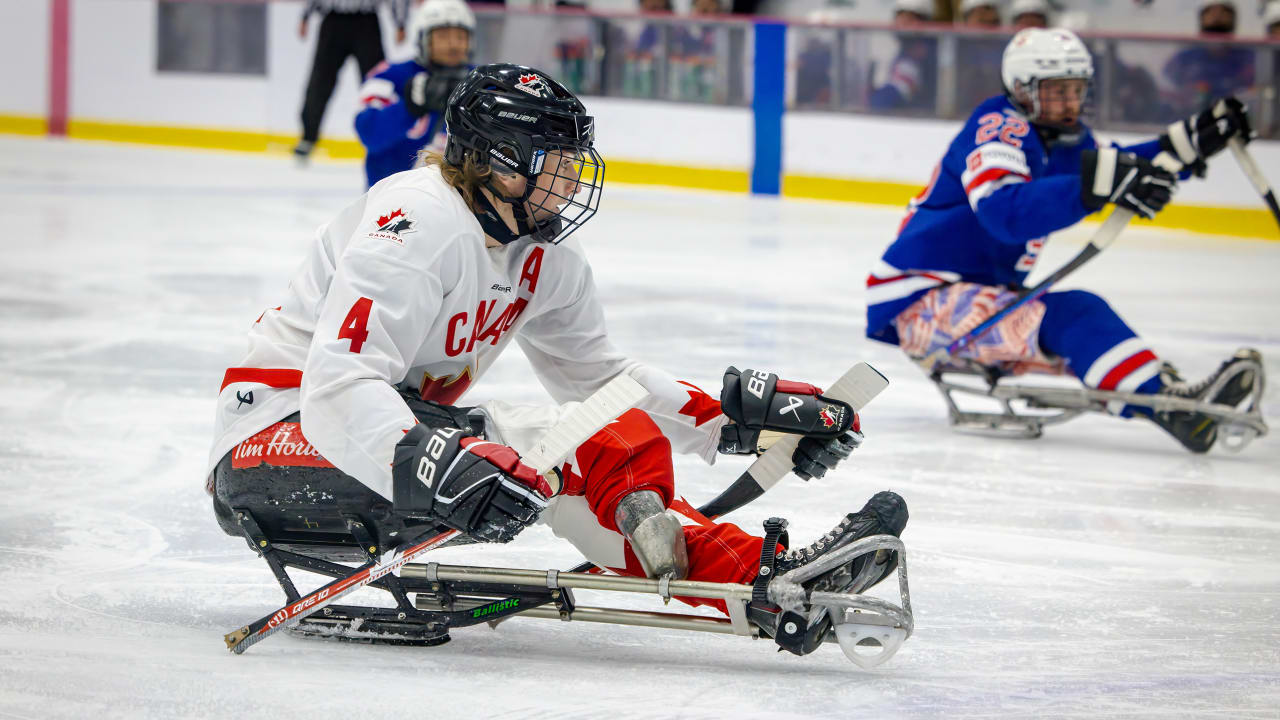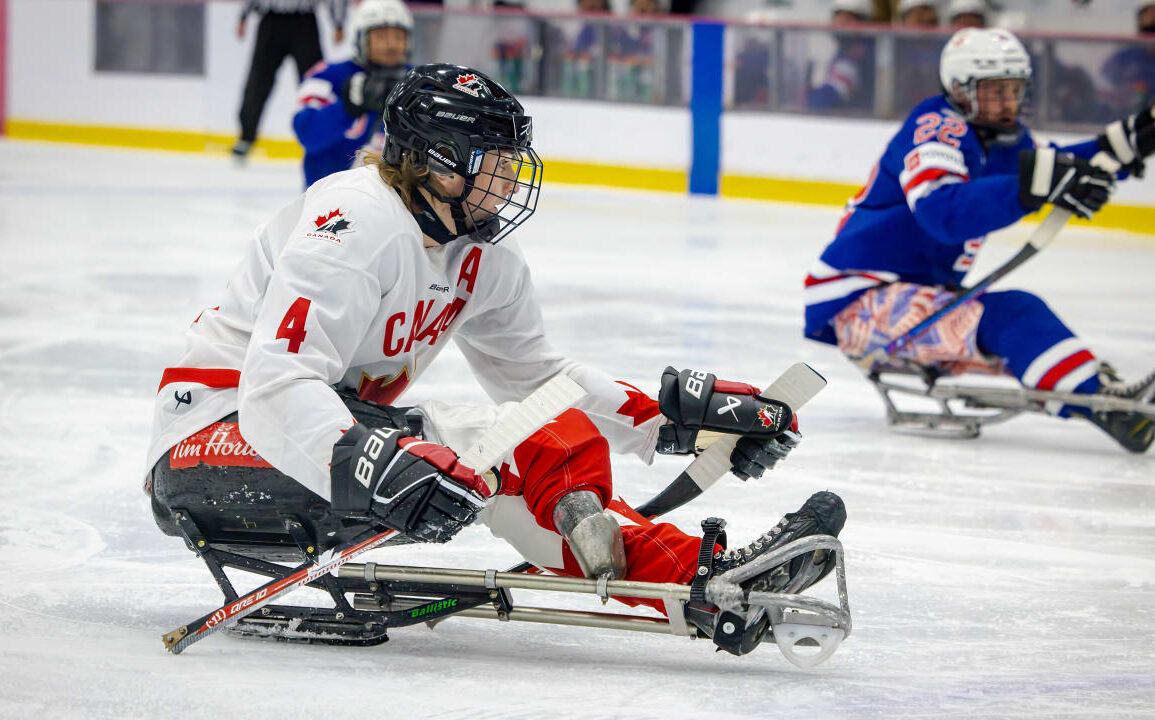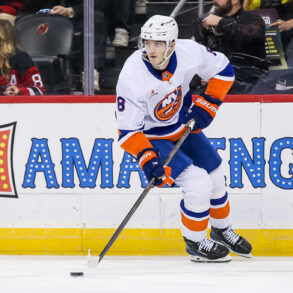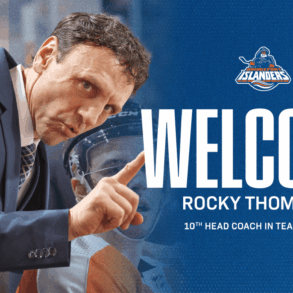
He had spindle cell sarcoma, a form of bone cancer, and a tumor had been growing for months, spreading throughout his leg.
To save his life, he had one choice, an amputation above his knee.
“As soon as I was healthy enough, I knew I wanted to play again at the highest level I could,” he said. “About a year post-chemo was the first time I got in a sled. And I knew pretty soon after that that was going to be my opportunity to represent my country and to compete at the highest level and to be able to continue to play.”
He had spent the entirety of his young hockey career focused primarily on his lower body, a necessity for the stand-up game. But playing sled hockey was completely different, requiring significant upper-body strength, requiring use of both his right and left arms and hands.
He became the kid in his sled in the basement. He became the kid who brushed his teeth and opened doors with his left hand, making sure that he did household tasks with his nondominant hand to train it for hockey.
He became the athlete he needed to be, in order to get to the highest levels.
He became the athlete Dunn needed, just at that moment.
* * * *
That first day, after they met, the two boys went off together, sharing their love of the game, of being out on the ice, the stunning commonalities in their stories.
“We were introduced to each other as two young hockey players who were just two young hockey fans, too,” McGregor said.
In so many ways, they could relate to each other, could understand what the rest of their families and friends could not. Their families, too, could relate.
As Dunn’s recovery continued, the pair agreed to meet at a tiny little rink in West Lorne, Ontario, in January 2013, where they had rented some ice. McGregor brought two sleds to use, just their families in attendance.
“He got me out on the ice for the first time in a sled and I kind of just fell in love with the game again, just in a different form,” Dunn said. “Being able to get back out on the ice was amazing and I really appreciate him for doing that for me.”
He tried skating on a prosthetic leg once, on the Rideau Canal in Ottawa, but he lasted only 10 or 15 minutes. The sled was right. Dunn never put skates on again, joining the Blizzards, a team out of London, to play sled hockey.
“He’d go for a treatment, then every Wednesday, he’d be at the rink on this sledge skating around with these guys, frail and white as a ghost, no hair,” Jeremy Dunn said. “But he just loved it.”
It was a new chance, an opportunity after the isolation of cancer, after being separated from the friends who could still play and skate, as they aways had. Dunn got that back. It made all the difference.
“Getting out on the ice, it gave me such a happiness,” Dunn said. “I was going through a pretty tough time battling cancer and him showing me that opportunity of being able to get on the ice again was amazing.”
It was something to look forward to, something to set his mind right.
At 15, just four years after his amputation, Dunn made the national team.
“It was like a full-circle moment from introducing me to the sport and then three or four years later, playing with him (McGregor) on the same team,” Dunn said. “And now he’s the captain of the team and I’m one of the [alternate] captains, so it’s pretty cool to be able to do that and to see how far we both have come together.”
* * * *
But cancer was not finished with Dunn.
Soon after he met McGregor, with the chemotherapy going well and signs looking up, Dunn slipped and fell. He started to feel unwell. They were at a London Knights Ontario Hockey League game, and Dunn started having trouble breathing, the family leaving after the first period.
He returned to the hospital, where they did X-rays on his chest.
They found a tumor, on his left side, near his lungs.
“Just when we thought everything was behind us, we get dealt another blow, right?” Jeremy Dunn said. “I think that’s the hardest thing to talk about is what he must have been going through. But to be honest with you, I think he was stronger than all of us.
“They said it was too messy, too big to operate on, and it came to a point where they said, ‘You’d better get your affairs in order.’ ”
Dunn was put on an aggressive chemo drug that, as his father said, “took him right to the brink,” as well as a feeding tube. But the drug was too aggressive, so it was swapped out for another, perhaps a last chance.
It took.
The tumor, which was located on his diaphragm, shrunk. Surgery was June 17, 2013. And though it would take five years of being cancer free for any of them to feel out of the woods, for the moment, they could breathe again.
* * * *
Each player soared on the national team, with McGregor heading to the 2013 World Championships in South Korea, his first time on a flight out of Canada, a reality so far from the one he viewed at his own that it was mind-bending. He returned with gold.
“It was three years after my cancer diagnosis and it was almost so surreal that I still can’t believe it,” McGregor said. “Because I was just filled with so much gratitude that I was able to find a way to play a sport that I loved, but also find this group of people that had become so special to me so quickly and to be able to share a moment of pure joy with them, it was just unbelievable.”
This post was originally published on this site be sure to check out more of their content.








